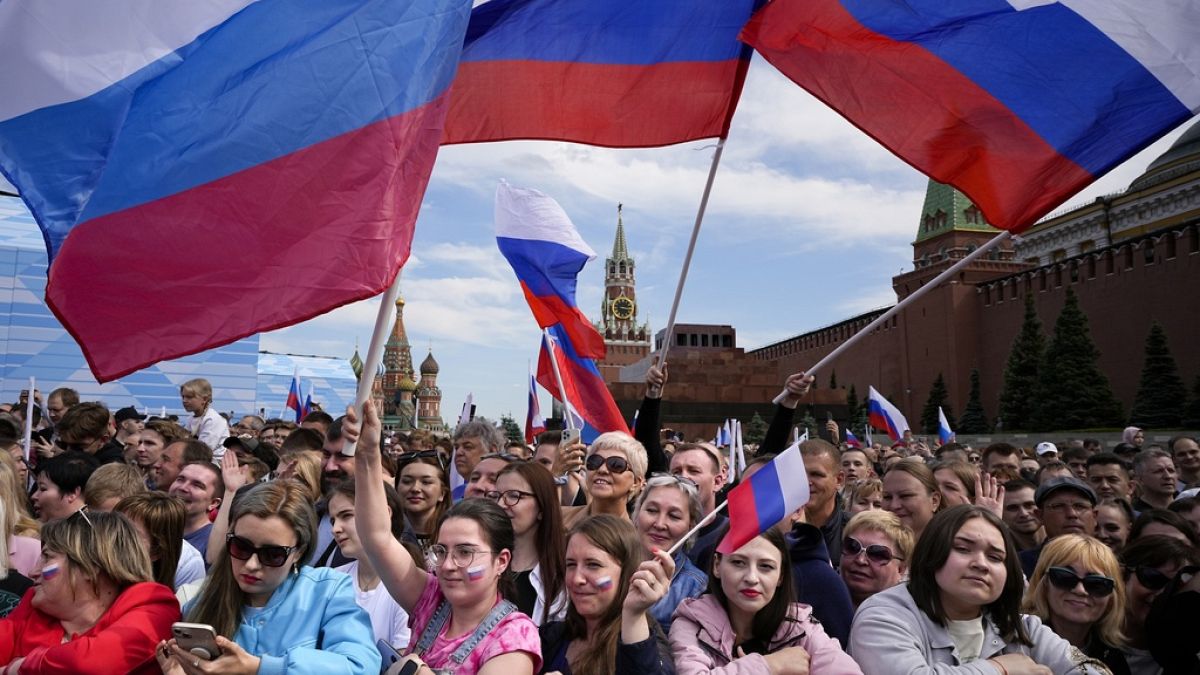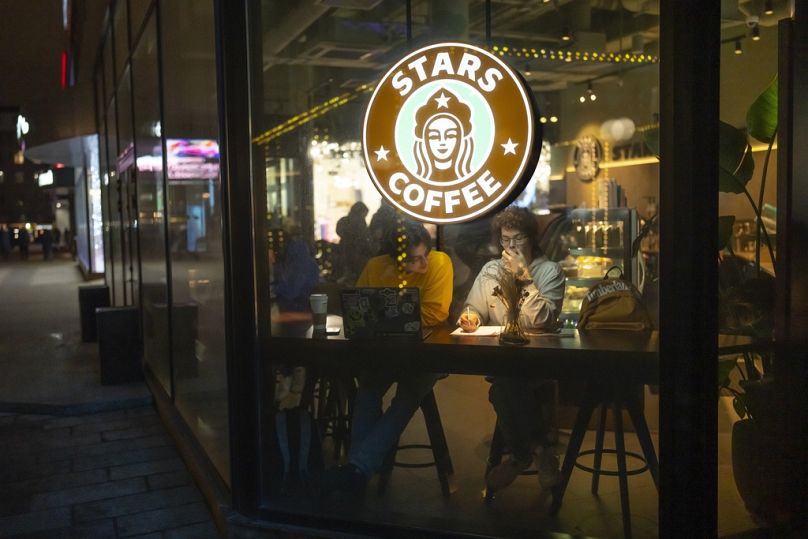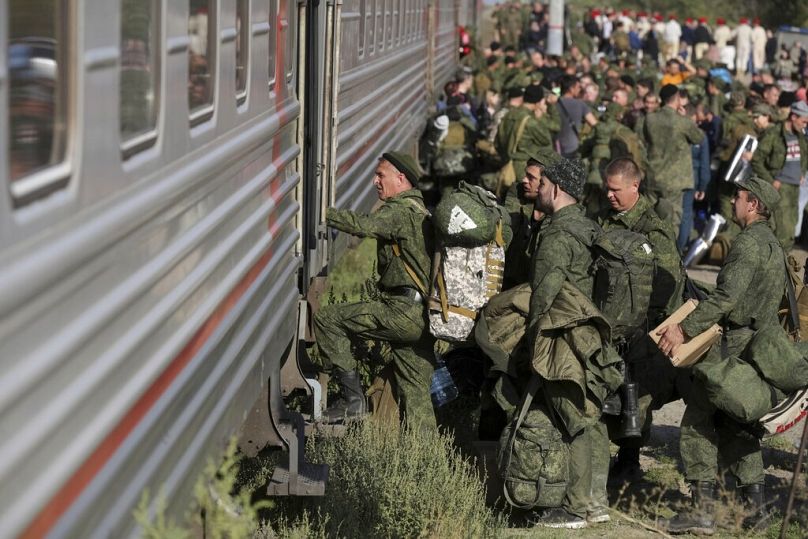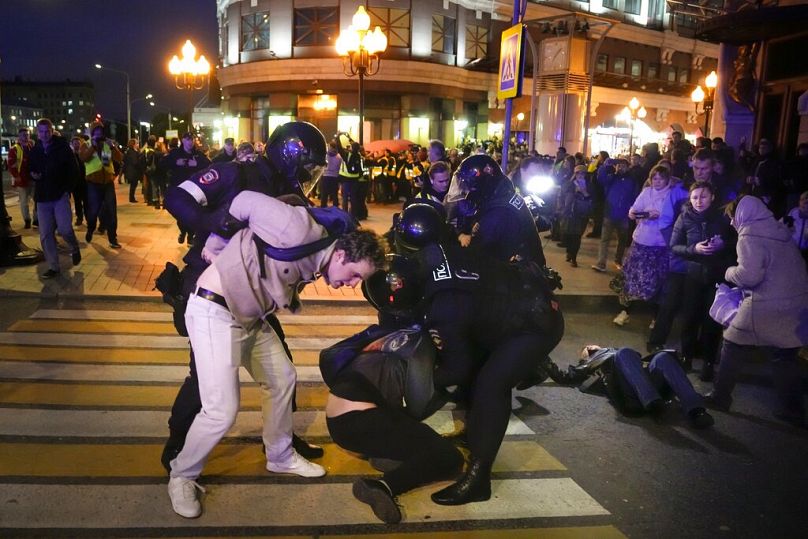According to experts, most of those in Russian society are ready for a long war in Ukraine and largely support President Putin's 'military operation'.
'Not anti-war' is the conclusion the Russian-based independent research organisation the Levada Centre has drawn on the public's opinion nearly a year and a half into the full-scale invasion of Ukraine.
Russian public opinion has fluctuated several times, but has generally remained stable, its director told Euronews.
According to the think tank (which has been declared a "foreign agent" by the Russian authorities), up to three-quarters of the population either generally support Russian President Vladimir Putin’s moves in Ukraine, or support them with reservations.
When asked "Do you personally support the actions of the Russian armed forces in Ukraine," 43 per cent answered "definitely yes," and 33 per cent answered "rather yes."
Denis Volkov, the Director of the Levada Centre, said "Z-patriots" make up about 25 per cent of the Russian population, who in principle, support the continuation of military action. About 10 per cent of these are ready to support the use of nuclear weapons.
The rest are those who do not support the war in Ukraine (or the "collective West" as Russian officials often refer to it), however, these Russian citizens find themselves in a situation where their upbringing and social traditions do not permit them to speak out against it.
"The situation is important here. It's just a situation of conflict because there are 'our own' and there are 'strangers'. We are for our own and against outsiders. It's quite simple," Denis Volkov explained.
"Support for Russian troops is now increasing in society as a whole," Dr Anna Matveeva, an affiliated senior researcher at King's College London, said.
"And it's not surprising why this is happening because even those who were initially against it are now thinking: 'Here, we've gone into battle, especially as the Ukrainian counteroffensive is going on, we can't lose now. These are our guys, our boys, our husbands. Even if the reason they are fighting is wrong, they are still our guys, our citizens. So we can't not support them'."
According to Volkov, there are three key factors that influence public sentiment in Russia.
1) Economy and welfare
In March 2022, Russia actually found itself in a financial panic - due to fears of the devastating effect of foreign sanctions. But the Russian leadership has managed to stabilise the situation.
The effects of Western sanctions, such as the departure of well-known foreign brands and companies primarily affected large cities, but not the whole country.
"It is important to understand that enormous resources have been spent to support this sentiment, to support the belief that, in general, the situation is stable. And for many, it may even have stopped getting worse," Volkov said.
By the end of last year, payments were organised for those involved [in the fighting], their families, as well as for pensioners, families with children. The minimum wage was raised.
And if last Spring the consolidation around the government, against the West, played a major role, then by the end of the year this support was just kept by economic factors," explained the Levada Centre's director.
2) Situation at the front
Individual retreats and defeats of the Russian army did not seriously affect sentiment, Denis Volkov added, but permanent setbacks "pile up" in the context of negative information. Information about the number of killed Russian soldiers is not publicly available, but over time this factor itself could also have a big impact.
3) Mobilisation
A 'partial mobilisation' announced by the Kremlin in the autumn of last year could, in theory, be the very factor that would change public opinion in Russia dramatically.
"In fact, on a national scale, not that many people have mobilised. But the social effect, the resonance was huge,” Dr Matveeva explained.
“That is why the authorities afterwards realised that mobilisation - unless there is an extreme case - should not be carried out, because it leads to an increase in social tensions".
Propaganda
Undoubtedly, Kremlin propaganda has been and remains an important factor. The Russian leadership is trying its best to turn even its own miscalculations to its advantage.
We are talking about the massive "aid to the front" movement in today's Russia - where citizens collect and send everything the Russian soldiers need in Ukraine, from shoes and food to drones and radios; that is, in effect, Russian citizens are making up for the supply shortfalls resulting from decisions made by the military and political leadership
"Yes, of course, people scold the government and say that since the Kremlin has shown itself to be helpless and disorganised, and in a rich country they cannot give people decent shoes, then ordinary people have to make up for such gaps. So for some, it takes on the features of such "people's war". So paradoxically, the state's failures in provision provide a field for society to enter the game," said Dr Matveeva.
Anti-war sentiment
Experts estimate the number of Russians who are fundamentally opposed to the war stand at 20 per cent or slightly less. In a year and a half, these figures have remained virtually unchanged.
Anti-war demonstrations were highly visible in major Russian cities in February and March 2022 but quickly faded away. In the Autumn of that year, against the backdrop of the 'partial mobilisation', came a second wave of demonstrations and protests - this time primarily in the national republics. But these were already smaller and less organised.
According to Matveeva, pacifist-minded Russians are deterred from protesting not so much because they fear the consequences, but because many believe that protests are pointless.
"They live in a society where protests can lead to very tangible penalties, up to and including criminal. And on top of that, loss of employment, fines, and ostracism. So there is both a fear and a feeling that one cannot change anything by protesting, that is, one exposes oneself and subsequently puts one's loved ones in great danger and one cannot achieve anything anyway."
At the same time, indirectly, the Kremlin does take public sentiment into account. According to experts, partial mobilisation" has shown the Russian leadership a 'red line' which should not be crossed.
"Whether citizens can influence decision-making through their direct actions is another matter, but the public mood, social support or non-support - they are calculated by the authorities, to what limit society can go. This line is very clear," said Dr Matveeva.
A traumatic factor
Nevertheless, for many of those who pay lip service to the war, or at least do not oppose it, the full-scale invasion of Ukraine has been a severe moral ordeal.
"People began to withdraw to solve everyday problems, economic problems. This was one of the mechanisms for adapting to what was happening: just shutting off from the news because it was very traumatic and continues to be for many, even those who support it.
And people told us: 'Look, it's impossible, the room for anxiety, for experiencing, is exhausted, you need to somehow remove yourself from this because you can't do anything anyway,'" said Volkov.
As a result, many Russians do not follow the war in Ukraine - intentionally or not.
"The events in Ukraine are not front a centre when it comes to the issues that most Russians think and worry about. There is maybe a quarter, a third of the population who are closely following the events.
"But in general, other things - career, children, opportunities, health, entertainment - overshadow this 'special military operation', as the authorities call it," Dr Matveeva concluded.



